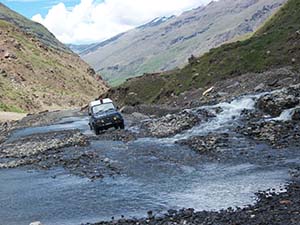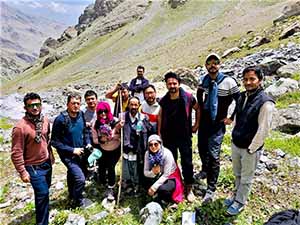LEH/SHIMLA: Experts from across India mainly from Himalayan states would churn out the strategy for harnessing tourism for sustainable mountain development. They will come out with recommendations and set targets for each Himalayan state at the four days long SMDS-XI summit being held from October 9 to October 12 at Leh.
The summit will bring local, national and global stakeholders and experts on board to discuss matters that are of pressing importance to the holistic and sustainable development of the Indian Himalayan Region(IHR) and more particularly the Ladakh region.
They will debate on topics ranging from Zero waste principles to Gender-balance and social inclusion, from carbon auditing to health protocols in the wake of Covid pandemic in IHR to arrive at the sustainable development goals (SDGs) for mountain communities.
Integrated Mountain Initiative(IMI), which is organising the SMDS-XI at Leh has roped in the institutional support of the Lt-Governor of Ladakh UT, Ladakh Autonomous Hill Development Council(LAHDC) and Sustainable Development Forum Ladakh to achieve the objectives of the Sustainable Mountain Development Summit (SMDS)-XI at Leh.
IMI President Dr PD Pai said the summit will draw on lessons from previous SMDSs to design the summit around ideas that reduce waste generation and recycling with a target to make this a zero waste summit.
Each aspect will be documented to enable scrutiny and analysis to identify failures, successes and lessons for future summits.
The efforts include the use of local material and skills to develop publicity material, use of digital technology, exclusion of disposable materials and plastic bottles, use of water dispensers, and collaboration with recycling agencies.
To achieve Gender-balance and social inclusion, SMDS-XI will be organising teams in terms of participation to ensure space for different voices and facilitate dialogues to develop pragmatic and inclusive policy frameworks.
The SMDS-XI will attempt to calculate the carbon footprint of the summit to help design more climate-sensitive summits in the future.
The main theme for SMDS-XI is ‘Harnessing tourism for sustainable mountain development’.
Tourism activities are closely interlinked with every section of society, especially in Ladakh and the IHR.
As a result, changes in the sector reverberate across cultural, social, and environmental systems and vice versa.
Mountain regions are especially vulnerable to such changes as their social and ecological systems are more fragile and vulnerable to challenges such as unplanned development, resource depletion, climate change and environmental degradation.
At the same time tourism has immense potential to empower local communities, conserve natural resources and achieve sustainable development.
IMI official Ramesh Negi said IMI and SDFL members held discussions with Lieutenant Governor of Ladakh, Shri R. K. Mathur and the Chairman of LAHDC, Leh, Shri Tashi Gyalson to identify sustainable tourism as an important topic that requires critical and sustained discussions.
“These discussions are important to reduce its negative impacts of tourism while harnessing its positive contributions to building climate and socio-ecological resilience and sustainability”.
Idea is to link with United Nation’s Sustainable Development Goals (SDGs).
The most relevant framework for sustainable tourism integrates SDGs and the broader 2030 Development Agenda developed by the UN World Tourism Organization (UNWTO).
“It has proposed five central pillars on which tourism must stand to make a significant and lasting contribution to achieve sustainable development goals”.
These include inclusive and sustainable economic growth, Social inclusiveness, employment and poverty reduction, resource efficiency, environmental protection and climate change, Cultural values, diversity and heritage, mutual understanding, peace and security.
SMDS-XI has rearranged the five pillars into four categories: Economy, Society, Environment, and Peace and Security.
In addition, related issues such as implementation of Extended Producer Responsibility (EPR) for improved waste management and the complex issue of plantations in the mountains are also included in the deliberations of SMDS-XI.
Furthermore, in moving forward and designing the sessions, there is a need to assess the gaps in and challenges for implementation of the existing and upcoming national policies and strategies for mountain tourism.
The experts will discuss on National Strategy for Sustainable Tourism, Draft National Tourism Policy (2021), A Tourism Vision of Ladakh, Ministry of Tourism, Vision 2050 for UT of Ladakh during summit.
Objectives of SMDS-XI:
- To discuss and advocate for sustainable tourism policies and programmes in Ladakh and the IHR,
- To share knowledge and inform policy and decision makers on the selected theme of Sustainable Tourism approaches for Ladakh and the
About IMI:
Integrated Mountain Initiative (IMI) is a civil society-led forum working across the Indian Himalayan Region (IHR) that comprises 10 mountain states, two union territories and four hill districts with a vision of “Making India proud of our Mountains”.
It brings mountain-specific issues to the centre stage in regional, national, and global discourses through sustained and informed dialogue among wide-ranging stakeholders.
It recognises the development challenges of the Indian Himalayan Region and the need to discuss mountain-specific issues through a process of continuous and sustained dialogue.






